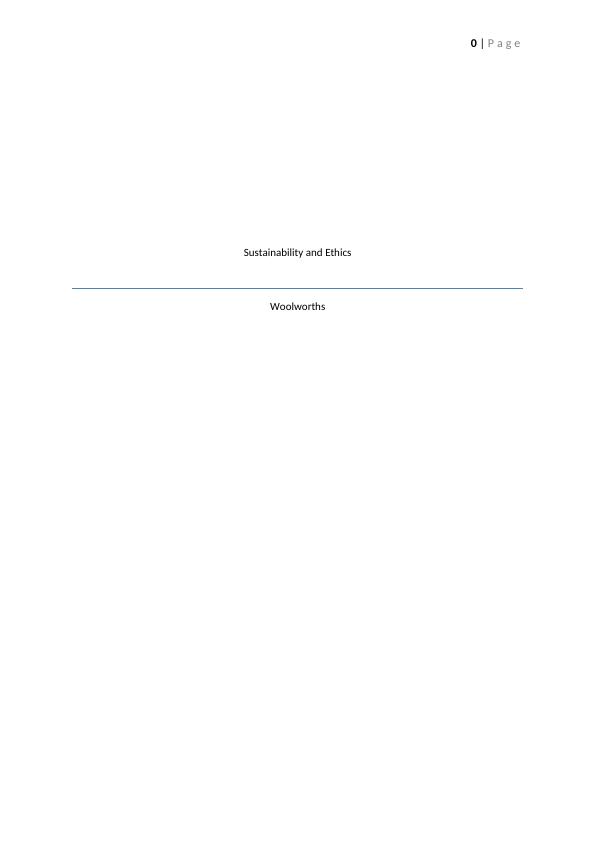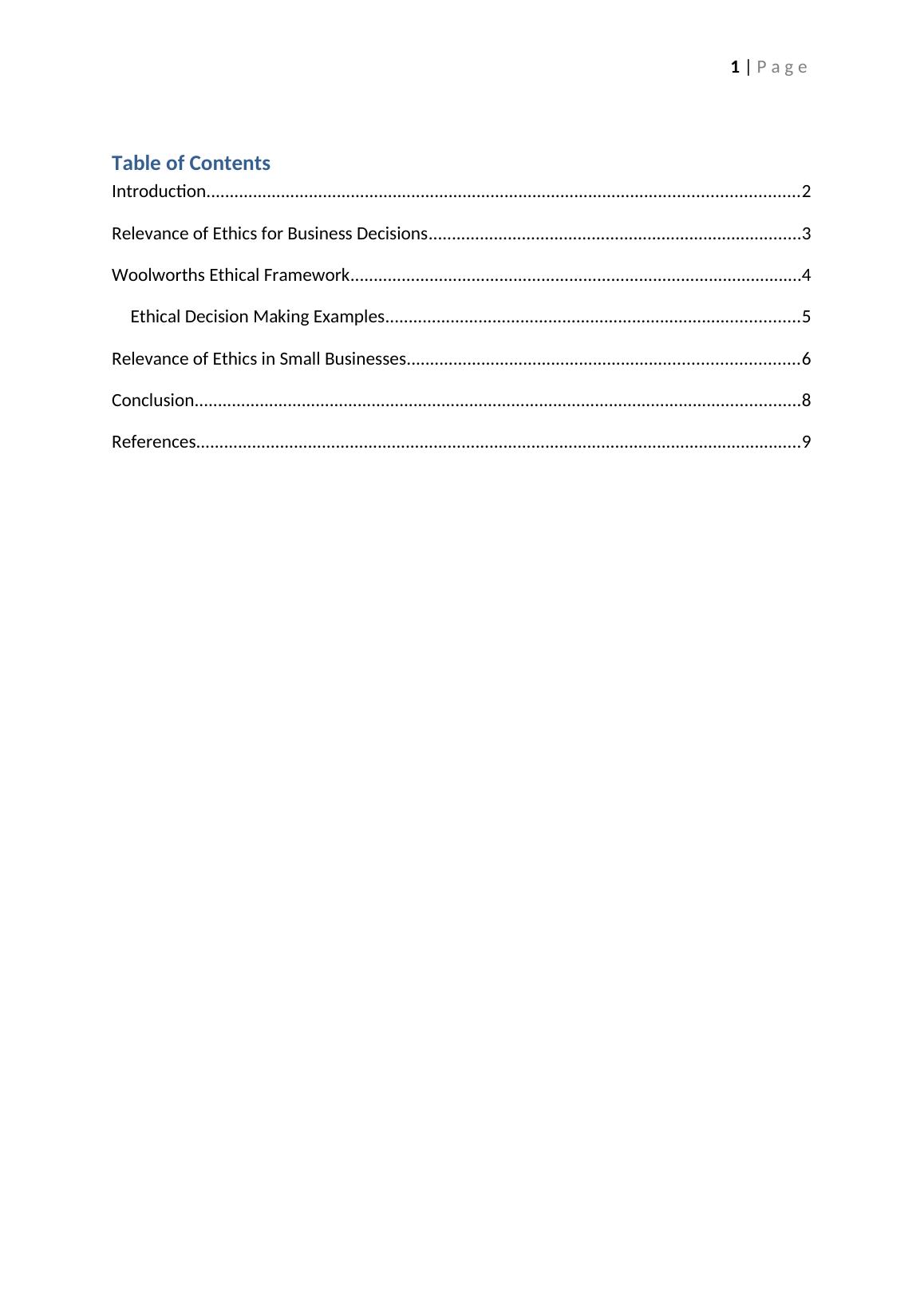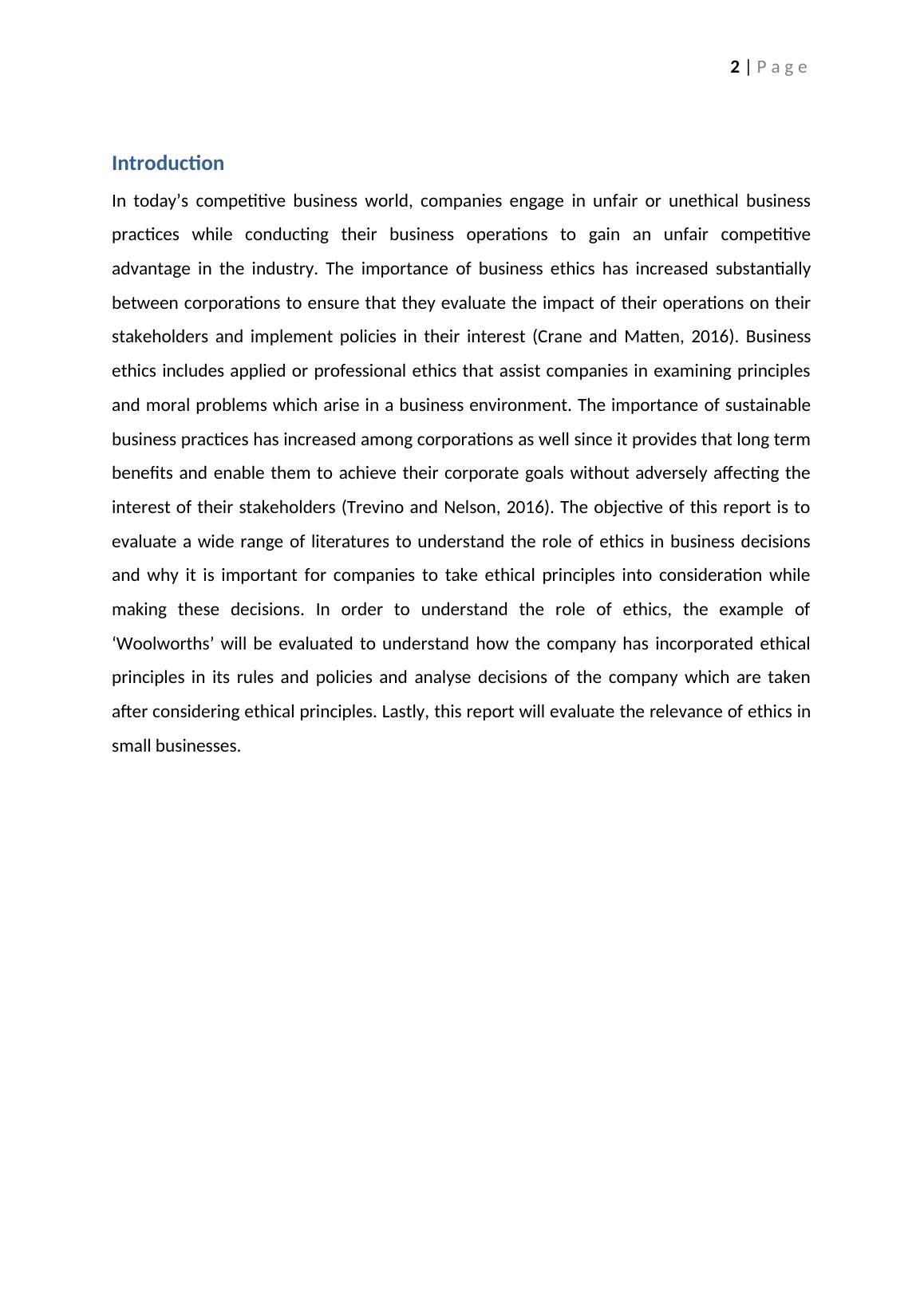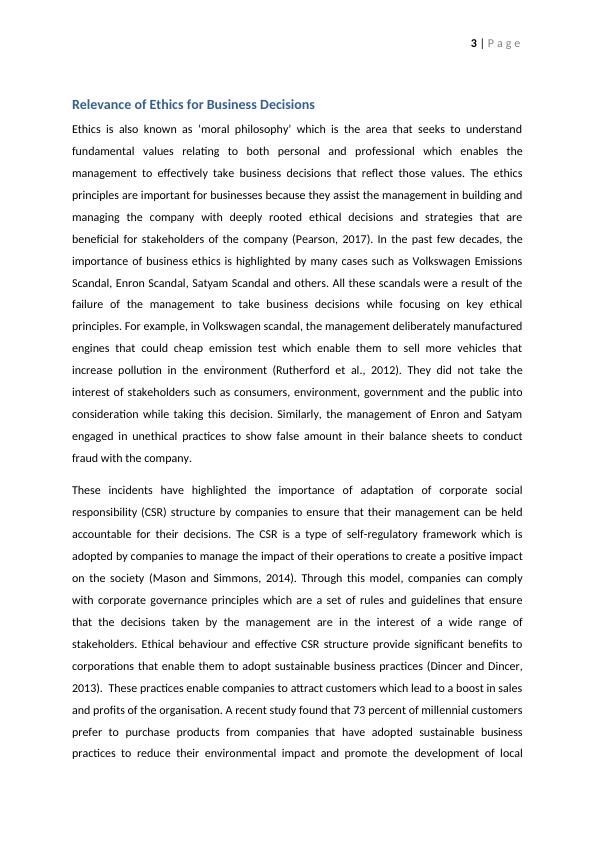Sustainability and Ethics in Business Decision Making: A Case Study of Woolworths
Added on 2023-04-11
12 Pages2610 Words109 Views
0 | P a g e
Sustainability and Ethics
Woolworths
Sustainability and Ethics
Woolworths

1 | P a g e
Table of Contents
Introduction...............................................................................................................................2
Relevance of Ethics for Business Decisions................................................................................3
Woolworths Ethical Framework.................................................................................................4
Ethical Decision Making Examples.........................................................................................5
Relevance of Ethics in Small Businesses....................................................................................6
Conclusion..................................................................................................................................8
References..................................................................................................................................9
Table of Contents
Introduction...............................................................................................................................2
Relevance of Ethics for Business Decisions................................................................................3
Woolworths Ethical Framework.................................................................................................4
Ethical Decision Making Examples.........................................................................................5
Relevance of Ethics in Small Businesses....................................................................................6
Conclusion..................................................................................................................................8
References..................................................................................................................................9

2 | P a g e
Introduction
In today’s competitive business world, companies engage in unfair or unethical business
practices while conducting their business operations to gain an unfair competitive
advantage in the industry. The importance of business ethics has increased substantially
between corporations to ensure that they evaluate the impact of their operations on their
stakeholders and implement policies in their interest (Crane and Matten, 2016). Business
ethics includes applied or professional ethics that assist companies in examining principles
and moral problems which arise in a business environment. The importance of sustainable
business practices has increased among corporations as well since it provides that long term
benefits and enable them to achieve their corporate goals without adversely affecting the
interest of their stakeholders (Trevino and Nelson, 2016). The objective of this report is to
evaluate a wide range of literatures to understand the role of ethics in business decisions
and why it is important for companies to take ethical principles into consideration while
making these decisions. In order to understand the role of ethics, the example of
‘Woolworths’ will be evaluated to understand how the company has incorporated ethical
principles in its rules and policies and analyse decisions of the company which are taken
after considering ethical principles. Lastly, this report will evaluate the relevance of ethics in
small businesses.
Introduction
In today’s competitive business world, companies engage in unfair or unethical business
practices while conducting their business operations to gain an unfair competitive
advantage in the industry. The importance of business ethics has increased substantially
between corporations to ensure that they evaluate the impact of their operations on their
stakeholders and implement policies in their interest (Crane and Matten, 2016). Business
ethics includes applied or professional ethics that assist companies in examining principles
and moral problems which arise in a business environment. The importance of sustainable
business practices has increased among corporations as well since it provides that long term
benefits and enable them to achieve their corporate goals without adversely affecting the
interest of their stakeholders (Trevino and Nelson, 2016). The objective of this report is to
evaluate a wide range of literatures to understand the role of ethics in business decisions
and why it is important for companies to take ethical principles into consideration while
making these decisions. In order to understand the role of ethics, the example of
‘Woolworths’ will be evaluated to understand how the company has incorporated ethical
principles in its rules and policies and analyse decisions of the company which are taken
after considering ethical principles. Lastly, this report will evaluate the relevance of ethics in
small businesses.

3 | P a g e
Relevance of Ethics for Business Decisions
Ethics is also known as ‘moral philosophy’ which is the area that seeks to understand
fundamental values relating to both personal and professional which enables the
management to effectively take business decisions that reflect those values. The ethics
principles are important for businesses because they assist the management in building and
managing the company with deeply rooted ethical decisions and strategies that are
beneficial for stakeholders of the company (Pearson, 2017). In the past few decades, the
importance of business ethics is highlighted by many cases such as Volkswagen Emissions
Scandal, Enron Scandal, Satyam Scandal and others. All these scandals were a result of the
failure of the management to take business decisions while focusing on key ethical
principles. For example, in Volkswagen scandal, the management deliberately manufactured
engines that could cheap emission test which enable them to sell more vehicles that
increase pollution in the environment (Rutherford et al., 2012). They did not take the
interest of stakeholders such as consumers, environment, government and the public into
consideration while taking this decision. Similarly, the management of Enron and Satyam
engaged in unethical practices to show false amount in their balance sheets to conduct
fraud with the company.
These incidents have highlighted the importance of adaptation of corporate social
responsibility (CSR) structure by companies to ensure that their management can be held
accountable for their decisions. The CSR is a type of self-regulatory framework which is
adopted by companies to manage the impact of their operations to create a positive impact
on the society (Mason and Simmons, 2014). Through this model, companies can comply
with corporate governance principles which are a set of rules and guidelines that ensure
that the decisions taken by the management are in the interest of a wide range of
stakeholders. Ethical behaviour and effective CSR structure provide significant benefits to
corporations that enable them to adopt sustainable business practices (Dincer and Dincer,
2013). These practices enable companies to attract customers which lead to a boost in sales
and profits of the organisation. A recent study found that 73 percent of millennial customers
prefer to purchase products from companies that have adopted sustainable business
practices to reduce their environmental impact and promote the development of local
Relevance of Ethics for Business Decisions
Ethics is also known as ‘moral philosophy’ which is the area that seeks to understand
fundamental values relating to both personal and professional which enables the
management to effectively take business decisions that reflect those values. The ethics
principles are important for businesses because they assist the management in building and
managing the company with deeply rooted ethical decisions and strategies that are
beneficial for stakeholders of the company (Pearson, 2017). In the past few decades, the
importance of business ethics is highlighted by many cases such as Volkswagen Emissions
Scandal, Enron Scandal, Satyam Scandal and others. All these scandals were a result of the
failure of the management to take business decisions while focusing on key ethical
principles. For example, in Volkswagen scandal, the management deliberately manufactured
engines that could cheap emission test which enable them to sell more vehicles that
increase pollution in the environment (Rutherford et al., 2012). They did not take the
interest of stakeholders such as consumers, environment, government and the public into
consideration while taking this decision. Similarly, the management of Enron and Satyam
engaged in unethical practices to show false amount in their balance sheets to conduct
fraud with the company.
These incidents have highlighted the importance of adaptation of corporate social
responsibility (CSR) structure by companies to ensure that their management can be held
accountable for their decisions. The CSR is a type of self-regulatory framework which is
adopted by companies to manage the impact of their operations to create a positive impact
on the society (Mason and Simmons, 2014). Through this model, companies can comply
with corporate governance principles which are a set of rules and guidelines that ensure
that the decisions taken by the management are in the interest of a wide range of
stakeholders. Ethical behaviour and effective CSR structure provide significant benefits to
corporations that enable them to adopt sustainable business practices (Dincer and Dincer,
2013). These practices enable companies to attract customers which lead to a boost in sales
and profits of the organisation. A recent study found that 73 percent of millennial customers
prefer to purchase products from companies that have adopted sustainable business
practices to reduce their environmental impact and promote the development of local

End of preview
Want to access all the pages? Upload your documents or become a member.
Related Documents
0. Corporate Governance. 1 A company is referred to anlg...
|3
|442
|324
Role of Auditors and Audit Committees in Corporate Governance: A Comprehensive Analysislg...
|17
|5286
|307
Investigation on Volkswagen Action Planlg...
|20
|6612
|45
Volkswagen Emission Scandal Name of the Student Name of the University Author's Notelg...
|19
|4672
|136
Business Ethics and a Global Perspective: Volkswagen Emission Scandal Caselg...
|12
|1067
|364
PPC – 301005 Ethics & Professional Responsibilitylg...
|10
|2697
|71
